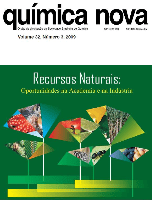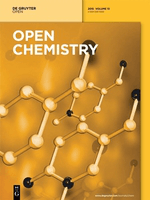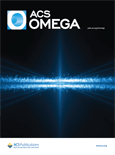
CHEMICKE LISTY
Scope & Guideline
Cultivating Knowledge for Tomorrow’s Chemists
Introduction
Aims and Scopes
- Chemistry Education and Pedagogy:
The journal emphasizes the importance of chemistry education, exploring innovative teaching methods and critical thinking development in chemistry. It addresses the challenges faced in educational settings and promotes effective strategies for engaging students. - Analytical Chemistry and Methods:
A core focus is on analytical methods and their applications, including developments in spectroscopy, chromatography, and electrochemical techniques. The journal seeks to advance methodological approaches for accurate analysis in various fields. - Biochemistry and Pharmaceutical Chemistry:
The journal publishes research related to biochemistry, including studies on drug development, biochemical markers, and the therapeutic potential of various compounds. This area highlights the intersection of chemistry with health sciences. - Environmental Chemistry:
Research on environmental topics, such as pollution, waste management, and the impact of chemicals on ecosystems, is a significant theme. The journal aims to raise awareness about environmental issues and promote sustainable practices. - Historical and Sociocultural Aspects of Chemistry:
The journal also explores the history of chemistry and its sociocultural implications, providing insights into the evolution of chemical science and its role in society.
Trending and Emerging
- Sustainability and Green Chemistry:
There is a notable increase in publications related to sustainability, including green chemistry practices and the development of eco-friendly materials and processes. This trend underscores the growing importance of environmentally conscious research. - Biotechnology and Bioengineering:
Research in biotechnology, particularly in drug discovery and biopharmaceutical development, is on the rise. This reflects a broader trend towards integrating biological systems with chemical processes for innovative solutions in health and medicine. - Interdisciplinary Approaches:
A significant trend is the integration of chemistry with other scientific disciplines, such as materials science, environmental science, and data science. This interdisciplinary focus is fostering innovative research and collaboration across fields. - Advanced Analytical Techniques:
There is an increasing emphasis on novel analytical techniques, including the use of nanotechnology and advanced spectroscopic methods. These developments are crucial for enhancing the sensitivity and specificity of chemical analyses. - Education Technology in Chemistry Teaching:
The incorporation of technology in chemistry education, such as online learning platforms and digital tools for teaching, is emerging as a key focus area. This shift reflects the need for modernized educational practices in response to changing societal expectations.
Declining or Waning
- Traditional Inorganic Chemistry:
There appears to be a decreasing emphasis on traditional inorganic chemistry topics, such as the synthesis and characterization of inorganic compounds. This decline may be attributed to a growing interest in interdisciplinary research that integrates inorganic chemistry with other fields. - Historical Studies on Lesser-Known Figures:
Research focusing on lesser-known historical figures in chemistry has become less frequent. While historical perspectives remain relevant, there seems to be a shift towards more contemporary applications and innovations in chemical research. - Basic Chemical Theory and Principles:
Papers that delve into basic theoretical concepts in chemistry, such as classical thermodynamics or basic reaction mechanisms, have diminished. This trend suggests a preference for applied research and practical applications over fundamental theoretical discussions.
Similar Journals

Brazilian Journal of Analytical Chemistry
Pioneering Analytical Methodologies for a New EraBrazilian Journal of Analytical Chemistry, published by VISAO FOKKA COMMUNICATION AGENCY, serves as a vital platform for those engaged in the field of analytical chemistry, especially within the Latin American context. With an ISSN of 2179-3425 and an E-ISSN of 2179-3433, this journal aims to promote high-quality research and advancements in analytical methodologies, instrumentation, and applications spanning from 2010 to the present. Although it currently holds a Q4 rank in Analytical Chemistry by Scopus and is placed at the 24th percentile, its commitment to open access publishing provides invaluable opportunities for widespread dissemination of knowledge, catering to researchers, professionals, and students alike. The journal's editorial board comprises emerging and established experts aiming to bridge gaps in analytical chemistry research, particularly in a Brazilian and broader South American context. Situated in São Paulo, Brazil, the journal's role in fostering innovation and collaboration in analytical techniques makes it an essential resource for the academic community.

Moscow University Chemistry Bulletin
Empowering the Next Generation of ChemistsMoscow University Chemistry Bulletin is a distinguished academic journal dedicated to advancing the field of chemistry, published by PLEIADES PUBLISHING INC. With an ISSN of 0027-1314 and an E-ISSN of 1935-0260, this journal provides a platform for researchers, professionals, and students to explore a wide range of topics in general and specialized chemistry. While it holds a current Q4 ranking in the “Chemistry (miscellaneous)” category according to Scopus, the journal is committed to broadening its scope and visibility, aiming for greater impact in the global scientific community. Moscow University Chemistry Bulletin focuses on the publication of cutting-edge research, reviews, and discussions that stimulate innovation and collaboration. Although it is not an Open Access journal, it plays a crucial role in disseminating knowledge and fostering academic dialogue within the field, as it converges towards significant findings from 2004 to 2024. The continuous development of its content holds the potential to attract a diverse readership, making it a valuable resource for those involved in the chemical sciences.

QUIMICA NOVA
Exploring New Frontiers in Chemistry Since 1997QUIMICA NOVA is a premier open access journal published by the SOC BRASILEIRA QUIMICA, dedicated to advancing the field of chemistry through the dissemination of high-quality research. Since its inception in 1997, the journal has provided a platform for innovative studies and scientific dialogue, making it a valuable resource for researchers, professionals, and students alike. With a focus on miscellaneous areas of chemistry, QUIMICA NOVA occupies a notable position with a 2023 Scopus ranking of #289 in General Chemistry, representing the 29th percentile among its peers. The journal's commitment to accessible science is underscored by its open access model, enabling broader readership and engagement. Hailing from Brazil, QUIMICA NOVA continues to contribute significantly to the global chemistry community, providing insights that drive progress and foster collaboration across disciplines.

Analytical Science and Technology
Fostering collaboration and knowledge in diverse scientific fields.Analytical Science and Technology is a prominent journal dedicated to advancing the fields of analytical chemistry and technology, published by the Korean Society for Analytical Science. Based in South Korea, this journal serves as a vital platform for researchers, professionals, and students committed to exploring innovative analytical techniques and methodologies. Although it is classified under Q4 in various subject categories, including Agronomy and Crop Science, Environmental Chemistry, and Pharmacology, the journal aims to provide critical insights and contributions to the scientific community. With ISSN 1225-0163 and E-ISSN 2288-8985, it spans a converged timeline from 2019 to 2024. Despite its current standings in Scopus rankings, the journal is dedicated to improving its visibility and impact through rigorous peer review and high-quality publications, fostering knowledge sharing within its diverse academic fields. Researchers looking for a reliable outlet for their findings are encouraged to consider this journal as it continues to strive for excellence in analytical science.

Studia Universitatis Babes-Bolyai Chemia
Connecting Ideas, Advancing ChemistryStudia Universitatis Babes-Bolyai Chemia, published by UNIV BABES-BOLYAI in Romania, serves as a pivotal platform for the dissemination of innovative research in the field of chemistry. With an ISSN of 1224-7154, this journal has been actively publishing since 2009 and aims to foster scientific collaboration and knowledge sharing among researchers, professionals, and students alike. Although currently categorized in Q4 of the Chemistry (miscellaneous) field, the journal provides an essential venue for emerging studies that contribute to the diverse landscape of chemical research. With its commitment to accessibility and scholarly discourse, Studia Universitatis Babes-Bolyai Chemia remains an important resource for those seeking to stay abreast of the latest developments and trends in general chemistry, holding a Scopus rank within the lower quartiles. Researchers and practitioners are encouraged to engage with its content to enrich their own work and to aid in the advancement of the scientific community.

Pakistan Journal of Analytical & Environmental Chemistry
Unveiling Insights into Analytical MethodologiesPakistan Journal of Analytical & Environmental Chemistry, published by the University of Sindh, National Centre of Excellence Analytical Chemistry, is a distinguished platform that has been committed to promoting high-quality research in the fields of analytical and environmental chemistry since its inception. With an ISSN of 1996-918X and an E-ISSN of 2221-5255, this journal has established itself as an open-access resource since 2007, facilitating the dissemination of knowledge to a global audience. Acknowledged for its contributions, the journal currently holds a Q4 category ranking in both Analytical Chemistry and Environmental Chemistry as of 2023, with Scopus rankings placing it within the challenging competitive bracket. The journal aims to publish original research, reviews, and technical notes that elucidate contemporary challenges and advancements, making it an essential read for researchers, professionals, and students who are exploring innovative methodologies and solutions in chemical analysis and environmental monitoring. By fostering a collaborative research environment and encouraging multidisciplinary approaches, the Pakistan Journal of Analytical & Environmental Chemistry plays a crucial role in advancing the field and addressing environmental concerns in Pakistan and beyond.

Open Chemistry
Pioneering Open Access to Cutting-Edge Chemical InsightsOpen Chemistry, published by DE GRUYTER POLAND SP Z O O, is a distinguished peer-reviewed journal that has been serving the global chemistry community since its inception. With an ISSN of 2391-5420 and an E-ISSN also of 2391-5420, this open-access journal has been accessible to researchers and practitioners alike since 2015, ensuring a wide dissemination of high-quality research findings. Located in Germany, specifically at BOGUMILA ZUGA 32A STR, 01-811 WARSAW, MAZOVIA, POLAND, Open Chemistry aims to publish innovative research across various chemical disciplines, with special attention to miscellaneous chemistry and materials chemistry. It is currently ranked in the Q3 category for both fields as of 2023, reflecting its solid standing within the academic community, with specific ranks of 187/408 in General Chemistry and 153/317 in Materials Chemistry, corresponding to respective percentiles of 54 and 51. Open Chemistry not only enhances the accessibility of cutting-edge research but also serves as a vital resource for students, professionals, and scholars seeking to advance their knowledge in the rapidly evolving landscape of chemical sciences.

ACS Omega
Pioneering Research, Shaping the Future of Chemistry.ACS Omega is a prominent open-access journal published by the American Chemical Society that has been serving the global research community since its inception in 2016. With ISSN 2470-1343, it focuses on a wide array of topics within the realm of Chemistry and Chemical Engineering, making it a crucial platform for researchers and practitioners aiming to disseminate significant findings across these disciplines. The journal maintains an impressive standing, ranking in the Q2 quartile for both Chemical Engineering and Chemistry categories, highlighting its impact and relevance in contemporary research. Additionally, with its Scopus ranks placing it within the top 24% and 27% of General Chemistry and General Chemical Engineering respectively, ACS Omega continues to foster innovation and facilitate collaboration among scientists. As an Open Access journal, it ensures that research outputs are freely available to all, enhancing the accessibility and visibility of contributors’ work, thus playing a critical role in advancing scientific knowledge globally from its headquarters in Washington, D.C.

Journal of the Iranian Chemical Society
Pioneering Discoveries in the Heart of ChemistryThe Journal of the Iranian Chemical Society, published by SPRINGER, is a prominent academic journal dedicated to advancing the field of chemistry. With an ISSN of 1735-207X and an E-ISSN of 1735-2428, this quarterly journal has been contributing valuable research from 2006 to 2024. Situated in Germany, it serves as a vital platform for chemists and researchers to disseminate their findings, particularly within the miscellaneous chemistry category, where it ranks in the Q3 quartile for 2023. Despite its current lack of open access options, the journal maintains a solid presence in the academic community, evidenced by its Scopus ranking of #165 out of 408 in general chemistry and a commendable 59th percentile. The journal's objective aims to foster innovation and collaboration in chemical research, making it an essential resource for professionals and students keen on pioneering developments in the field. As a subscriber, you will gain insights into cutting-edge research that drives the future of chemistry.

Journal of Chemistry and Technologies
Elevating Standards in Chemical Research and Development.The Journal of Chemistry and Technologies, published by OLES HONCHAR DNIPROPETROVSK NATIONAL UNIVERSITY, is an open access journal dedicated to advancing knowledge in the broad fields of chemistry and chemical engineering since its inception in 2013. With ISSN 2663-2934 and E-ISSN 2663-2942, this journal provides a vital platform for researchers and professionals, particularly in Ukraine and beyond, to share innovative research findings and contemporary technological advancements. Currently ranked in the Q4 quartile in both Chemical Engineering and General Chemistry for 2023, it serves as an enriching resource for those interested in emerging trends and interdisciplinary studies within these domains. The journal adheres to high academic standards while fostering collaboration in the scientific community by offering open access articles that ensure visibility and accessibility to a global audience. As an important part of the academic landscape, the Journal of Chemistry and Technologies aims to inspire future research and development, paving the way for new discoveries and applications in chemistry-related fields.